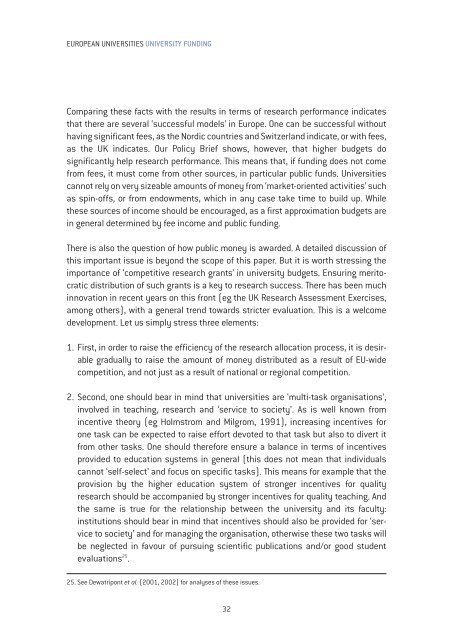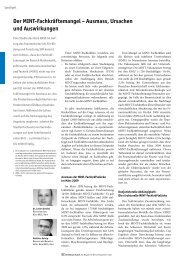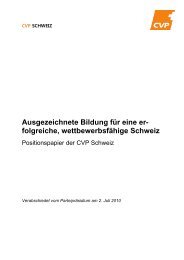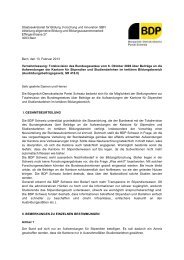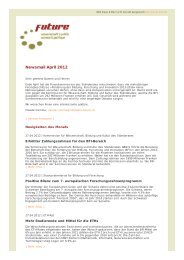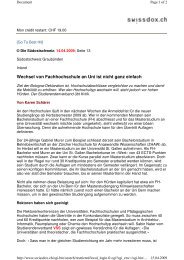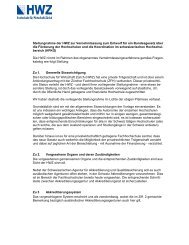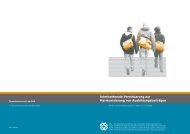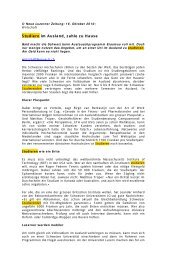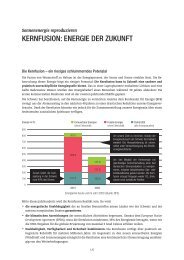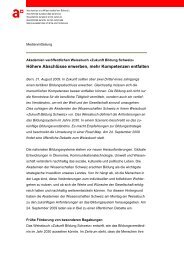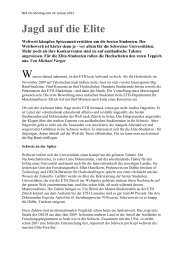Higher aspirations: an agenda for reforming European universities
Higher aspirations: an agenda for reforming European universities
Higher aspirations: an agenda for reforming European universities
You also want an ePaper? Increase the reach of your titles
YUMPU automatically turns print PDFs into web optimized ePapers that Google loves.
EUROPEAN UNIVERSITIES UNIVERSITY FUNDING<br />
Comparing these facts with the results in terms of research per<strong>for</strong>m<strong>an</strong>ce indicates<br />
that there are several ‘successful models’ in Europe. One c<strong>an</strong> be successful without<br />
having signific<strong>an</strong>t fees, as the Nordic countries <strong>an</strong>d Switzerl<strong>an</strong>d indicate, or with fees,<br />
as the UK indicates. Our Policy Brief shows, however, that higher budgets do<br />
signific<strong>an</strong>tly help research per<strong>for</strong>m<strong>an</strong>ce. This me<strong>an</strong>s that, if funding does not come<br />
from fees, it must come from other sources, in particular public funds. Universities<br />
c<strong>an</strong>not rely on very sizeable amounts of money from ‘market-oriented activities’ such<br />
as spin-offs, or from endowments, which in <strong>an</strong>y case take time to build up. While<br />
these sources of income should be encouraged, as a first approximation budgets are<br />
in general determined by fee income <strong>an</strong>d public funding.<br />
There is also the question of how public money is awarded. A detailed discussion of<br />
this import<strong>an</strong>t issue is beyond the scope of this paper. But it is worth stressing the<br />
import<strong>an</strong>ce of ‘competitive research gr<strong>an</strong>ts’ in university budgets. Ensuring meritocratic<br />
distribution of such gr<strong>an</strong>ts is a key to research success. There has been much<br />
innovation in recent years on this front (eg the UK Research Assessment Exercises,<br />
among others), with a general trend towards stricter evaluation. This is a welcome<br />
development. Let us simply stress three elements:<br />
1. First, in order to raise the efficiency of the research allocation process, it is desirable<br />
gradually to raise the amount of money distributed as a result of EU-wide<br />
competition, <strong>an</strong>d not just as a result of national or regional competition.<br />
2. Second, one should bear in mind that <strong>universities</strong> are ‘multi-task org<strong>an</strong>isations’,<br />
involved in teaching, research <strong>an</strong>d ‘service to society’. As is well known from<br />
incentive theory (eg Holmstrom <strong>an</strong>d Milgrom, 1991), increasing incentives <strong>for</strong><br />
one task c<strong>an</strong> be expected to raise ef<strong>for</strong>t devoted to that task but also to divert it<br />
from other tasks. One should there<strong>for</strong>e ensure a bal<strong>an</strong>ce in terms of incentives<br />
provided to education systems in general (this does not me<strong>an</strong> that individuals<br />
c<strong>an</strong>not ‘self-select’ <strong>an</strong>d focus on specific tasks). This me<strong>an</strong>s <strong>for</strong> example that the<br />
provision by the higher education system of stronger incentives <strong>for</strong> quality<br />
research should be accomp<strong>an</strong>ied by stronger incentives <strong>for</strong> quality teaching. And<br />
the same is true <strong>for</strong> the relationship between the university <strong>an</strong>d its faculty:<br />
institutions should bear in mind that incentives should also be provided <strong>for</strong> ‘service<br />
to society’ <strong>an</strong>d <strong>for</strong> m<strong>an</strong>aging the org<strong>an</strong>isation, otherwise these two tasks will<br />
be neglected in favour of pursuing scientific publications <strong>an</strong>d/or good student<br />
evaluations 25 .<br />
25. See Dewatripont et al. (2001, 2002) <strong>for</strong> <strong>an</strong>alyses of these issues.<br />
32


